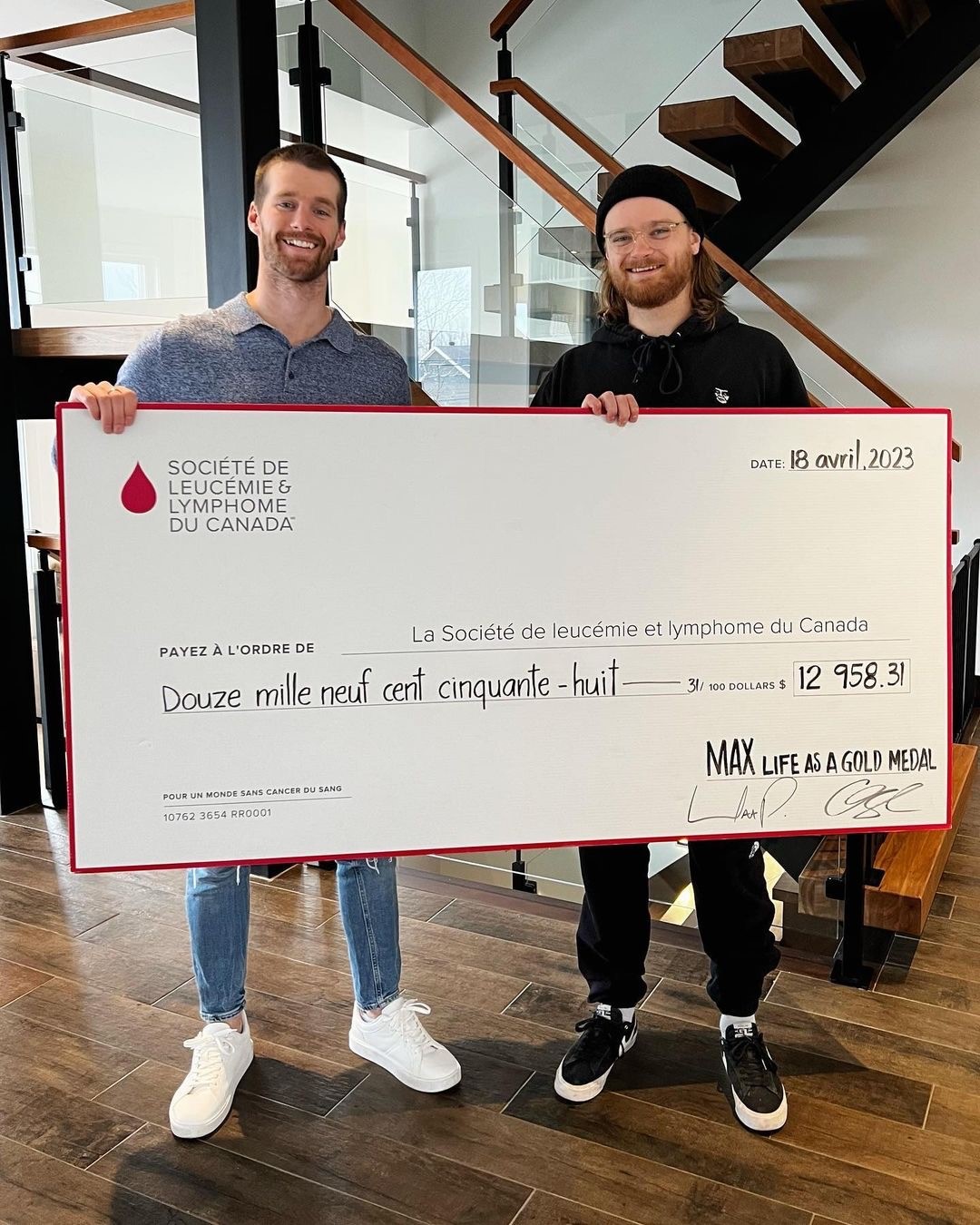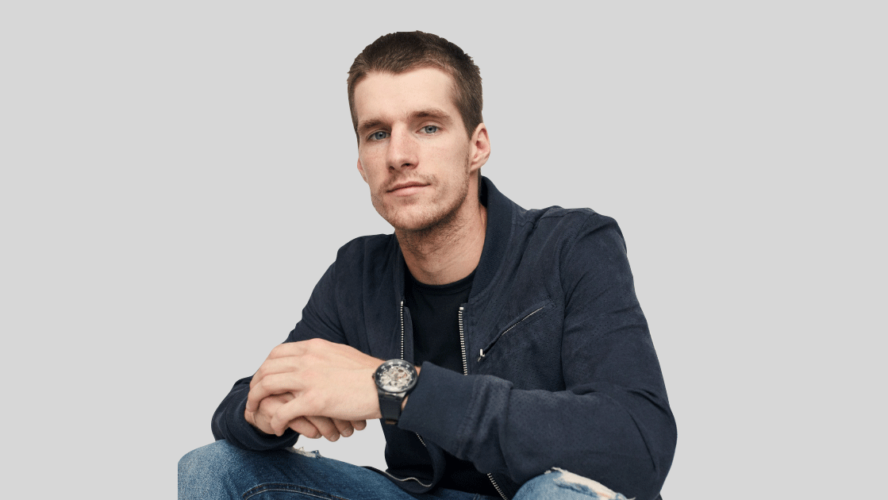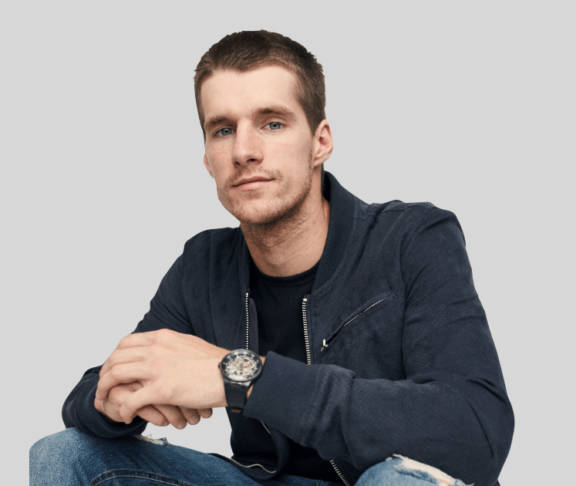Max Parrot’s battle with Hodgkin’s lymphoma was a profound journey that culminated in an Olympic gold triumph. From the depths of illness to the heights of athletic glory, Parrot’s unwavering determination served as an inspiration and ignited a passionate drive within him to raise awareness about the disease.

How did you find you had Hodgkin’s Lymphoma, what were some of the signs and symptoms?
It was a weird time because I was feeling in shape. At the beginning of the season, I had normal nights and lots of energy. I had trained all summer and was ready for the season to start. I was excited to travel and participate in contests. The motivation, determination, focus, and concentration were all there. However, at the end of October, I discovered a swollen node on my neck. Initially, I didn’t pay much attention to it because sometimes my nodes swell when I’m about to get a cold or the flu. I thought I might get sick in a week or two. After a month, I realized the knot was still there, and I didn’t feel sick. Normally, when my nodes are swollen, I get sick within a week. With only one swollen node that was getting bigger, I decided to see my family doctor.
I was on a trip when I decided to take it more seriously and get it checked out. It was the end of November, and I was traveling to Yukon and then China for a contest. After the contest in China, around early December, I went to see the doctor. As soon as the doctor saw the node, he immediately told me to go to the hospital for a biopsy, which he scheduled within a day. I realized it was serious if I could get a biopsy appointment so quickly, as there was a chance it could be cancer. That’s how everything started. It was strange because I felt completely normal without any noticeable symptoms, except for the swollen node.

Tell us about what it was like to battle cancer while being a professional athlete?
Well, it definitely was a big shock because, you know, for me, I’ve been a professional athlete since I was 18. Officially I started driving the world at 16, but it was a professional at 18. And in my career, I have never ever missed one single event, for injuries or anything. I’ve always been present, even if I was feeling sick or had a problem in my leg or arm or whatever, I was still doing all the contests because I’m a really hard worker in life and then I had not to miss one contest, but I had to miss the whole season. So this was a big shock for me because as a professional athlete, snowboarding was my life, you know, I think in individual sports, a lot of people say we’re self-centered in a way, it’s the way to perform and all we can think is our sports and how to be better. For the past years, all I could think was the boarding and then I had to miss the whole season, and not travel at all. It was a big shock for me to just digest and what’s weird, it was almost a bigger shock for me. Not being able to snowboard during a full winter than the actual cancer. Just because snowboarding was all I knew, you know, and I was being taken away from it. So, that was really a big shock for me and I remember I even said to the doctor when she announced me officially that I had cancer and she told me, you know, you had to start chemo in like two weeks and I was like, oh, well, this game is in like four weeks, you know, and I feel in shape, my energy is there, you know, can we just, I was thinking about pushing the treatment after the season so I could compete. Yeah. But, you know, I didn’t really know exactly what cancer was at that time also. I was a little bit ignorant about it. And, obviously when the doctor at that moment, she started explaining to me exactly what cancer is and when she told me that, she told me, of course, we can put a treatment after the season. We can do it in three months, in a year, whenever you want, you know, but just so, the more we wait, the less chance you have of surviving and cancer in the end is going to kill you. So I was like, ok, shit, maybe it’s more important to take care of that person.

What is your role like as an ambassador for LLSC?
So the LLC, when I announced publicly that I was diagnosed with cancer, they reached out to me and I didn’t really know what they were before. To be honest, even before I was diagnosed, I didn’t really know what cancer was exactly. I never put time or donated any money before that as well. I was just in another part of the world. I was, say, I just didn’t know what all this was about. They came to me and started explaining what the organization was and how they’ve been helping people all over Canada. Research is important and makes a difference, especially in terms of treatments and survival rates. It has been increasing every year, like in the past century. When they told me that my cancer, the exact type I had, in 1950 had a below 30% chance of surviving, I felt lucky to be in 2020 because now it’s over 80% chance, maybe even 90%. But all those numbers are online if you dig a little bit. Today, it is over 80% chance of surviving, thanks to donations and organizations like this. I am so grateful for all the people who have donated in the past years. I felt lucky and grateful, and being asked to be a spokesperson for this organization was a huge honor for me. I wanted to give back and help others because I’ve been helped by everyone who donated in the past years. I just wanted to be part of it because it’s a great organization. It was an honor to help. I was able to help raise awareness and gather money for them. We are still together years after, and my goal is to continue being with this organization for many years ahead because I’m alive today because of them. That’s how it started with them, and it motivated me to gather money. Every year, I’ve been able to give thousands of dollars and reach thousands of dollars from people to help this organization. It’s important to me to keep helping others. Even though my cancer has over 80% survival rate, there are still people dying out there. It’s my cause, especially because this cancer mostly affects young people. No one deserves to die. My goal is to keep fighting and raise as much money as possible to reach 100% survival rate.

Why is important for Canadians to donate to organizations like LLSC?

So, I mean, I think we all know someone who has or had cancer, whether it’s with the LLC, like leukemia and lymphoma, or another type of cancer. It’s important to support the things that are important to us. The LLC has touched my heart because I’ve been a part of it. Through my social media, I shared my journey and received messages from people who knew someone with the same cancer or who had recently been diagnosed or were fighting for months. Hearing their stories from people in Canada and around the world touched me deeply. That’s why this cause is important to me. There are many ways to help and share, like participating in events such as Light the Night, which we have here in Montreal and across Canada. Going on their website can help you find events near you or simply donating, even a small amount of money, makes a difference. Every penny counts. By getting involved and donating, you can be part of it without necessarily attending events or dedicating a lot of time. Small donations make a big difference in the end.

How does it feel to be an inspiration?
Not only as a Canadian professional athlete, but really in this space and using your platform to inspire and help others. Well, my goal is never to be an inspiration. It just kind of came with it. I’m definitely happy to know that I inspire people, but I’m a very humble person at the root. I don’t do things to get attention or anything like that. With my cancer, I had no choice but to be public because I’m a public person. I announced that I wouldn’t be able to participate in eight games, and I felt like I had no choice but to tell the world what was going on. Honestly, I didn’t want to share it at first. It’s such a hard thing to swallow, having cancer. I would have preferred to keep it to myself if I wasn’t a public figure. But then, by sharing my story, I received so much love and messages from people sharing their personal stories. It made me feel like I could help others, and that’s when I became proud to share my story. I felt like I did the right thing. I’ve received messages from people telling me that my story has helped them battle cancer, even today. Every time I receive a message like this, it touches my heart and feels great. It motivates me to keep sharing my story and helping others fight their way. Receiving messages that my story has helped others makes me feel even more motivated to continue helping because I don’t want anyone to experience what I’ve been through. Going through cancer is like a horror scene. If I can help anyone with the way I’ve battled it, it’s definitely a pleasure for me in the end.


